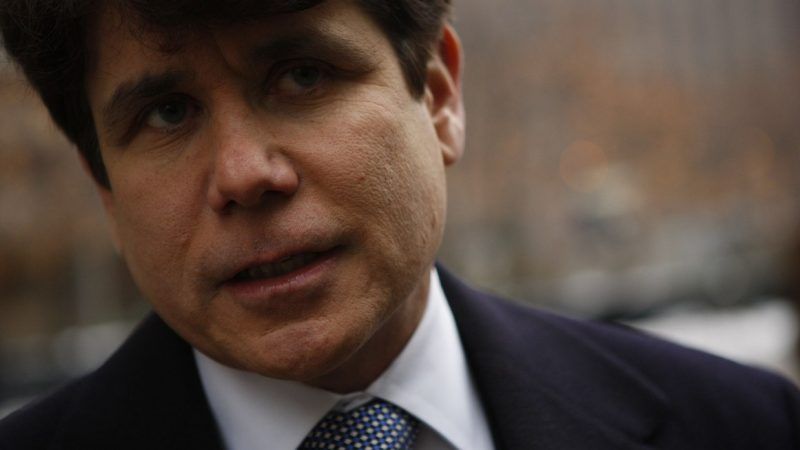Trump Mulls Commutation for Disgraced Former Illinois Gov. Rod Blagojevich
While the president's mercy might be self-serving, it's not necessarily wrong.

President Donald Trump is reportedly considering commuting the federal prison sentence for former Illinois Democratic Governor Rod Blagojevich. His comments to reporters on Air Force One last night have unleashed yet another round of outrage.
Blagojevich is about halfway through a 14-year prison sentence for political corruption. He was convicted of pay-to-play tactics that involved allegations he attempted to sell the U.S. Senate seat vacated by Barack Obama after Obama was elected president.
Trump's reasons for considering commuting Blagojevich's sentence are personal to the point of comic absurdity. When talking to reporters last night, Trump pointed out that Blagojevich had been on his show, Celebrity Apprentice, before saying he thought that Blagojevich had been "treated unbelievably unfairly." He blamed Blagojevich's conviction on former FBI Director James Comey's "gang and all these sleazebags." The Wall Street Journal notes that some conservative commentators have been hot on the fact that Robert Mueller was director of the FBI when Blagojevich was arrested. The idea that any of that would or should relate to how Trump is being treated and investigated is utter nonsense (nobody had an inkling at the time that Trump would become president), but that's the kind of environment we're in.
Trump furthermore complained to reporters last night, "You have drug dealers that get not even 30 days, and they've killed 25 people." We can only hope that was deliberate hyperbole, and that Trump doesn't actually believe this.
As is typical, the "optics" are inspiring the most anger. While Trump was talking about Blagojevich's raw deal, federal Immigration and Customs Enforcement officers were rounding up hundreds of immigrants working at meat processing plants in Mississippi for suspicion of being in the country illegally (many of those people have since been released). Attorney General William Barr has announced the Justice Department will resume executing inmates on death row after a decades-long moratorium, and Trump has made it clear that he'd like to see even more prisoners face the death penalty. The administration has continued Obama's war on whistleblowers, as Reality Winner languishes in federal prison for leaking documents that show how Russian hackers attempted to infiltrate and potentially manipulate voting systems across the country. More recently, Daniel Everette Hale, who exposed problems with how drones were being used for assassination strikes in foreign countries under Obama, was arrested and charged by Trump's administration with a host of crimes.
In other words, Trump talking about Blagojevich's unfair treatment sounds pretty hollow coming from the head of an administration that should be remembered for its intentional, callous, and reckless cruelty (Support for the FIRST STEP Act aside).
And yet, Trump's not wrong on this. The Wall Street Journal notes that Rev. Jesse Jackson (whose son was also caught up in a corruption case years later) is encouraging Trump's mercy. The relevant question here is whether there's a public safety need to keep Blagojevich in a federal prison cell. The answer is a resounding no.
Blagojevich poses no physical threat to anyone outside of a federal prison. His political record is so tainted that he'd have a hard time running any sort of scam in the free world. The only reason to keep him in prison is to debase and punish him for abusing the powers of his office. That desire is understandable, but we should be asking ourselves whether there's any real value to his continued incarceration and whether that value exceeds the cost of keeping him behind bars.
Trump appears motivated to exercise mercy for the wrong reasons: his personal relationship with Blagojevich and his desire to undermine anybody remotely connected to the investigation against him and his campaign. But it is nevertheless important to foster an attitude of mercy toward federal prisoners, who face excessive sentences and do not have the option of parole.
We should be encouraging Trump to free more prisoners, even if that means he'll free some of them for the wrong reasons.
Show Comments (43)